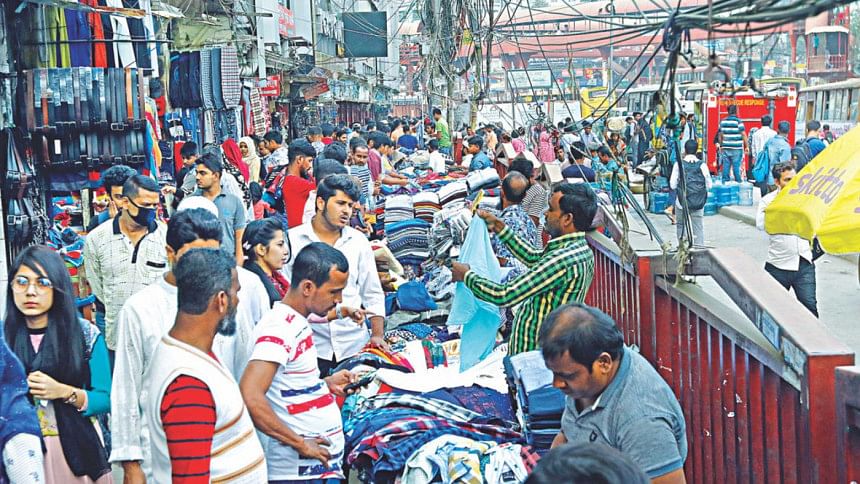The perils of Dhaka’s street vendors

Street vendors in Dhaka are popular for selling a wide range of goods at a lower price to customers, mostly from middle and low-income communities. They sell their products in makeshift shops set up on the sidewalks. This informal sector operates without approval from authorities. That is because, for any business in Bangladesh, one must obtain a trade license.
A trade license is only provided if the applicant provides details of a bank account, office address, copy of utility bill, national identity card, e-TIN number, among other documents. A hawker, however, does not have an office address and usually does not have a bank account. Thus, they cannot obtain a trade license to run their business.
The government does not have any alternative policy or process to provide trade licenses or any other authoritative document to hawkers. This legal disapproval, along with general acceptance among the public, has created certain complexities.
The formation and protection of such businesses are maintained by the "linemen", who are agents of local powerful people, mostly belonging to the ruling political party. Vendors pay rent to the linemen, and in return, get space to run their businesses. The rent is divided among multiple state and informal actors, meaning all of them have incentives to continue the system.
These linemen keep the vendors informed about possible eviction drives by the city corporation and also help them reinstate their carts after the drive is over. Additionally, vendors are beaten and harassed if they do not follow the linemen or fail to pay the rent on time.
The absence of legal recognition creates problems such as a lack of rights and proper working conditions. The most critical problem faced by hawkers is the constant threat of eviction.
The city corporations, being in charge of managing public spaces, generally take a reactive approach by destroying the establishments created by the vendors. However, with the help of local musclemen, who extort fees from them to set up their shops, they again return.
Hawkers have many trade unions and groups who are collectively voicing their demands for a solution from the authorities. In interviews conducted by BIGD, union representatives argued that linemen are vigilant in making sure that no forum is formed among the local street vendors. The informal governance mechanism aims to resist any collective functioning. As a result, they suffer from poor hygiene, lack of access to water and electricity, risk to their safety while working beside busy roads, etc. Extreme weather and dirty streets also affect their health and livelihood.
Covid-19 added to their woes. During the lockdowns, thousands of hawkers were completely out of business for months. Daily sales drastically decreased, partly because street vendors could not engage with customers due to increased concerns around health and hygiene.
Existing informality in the system remains the biggest barrier to solving these problems. Due to the lack of legal recognition, the government has no mechanism to work toward hawkers' rights. It also diminishes the government's incentive to work in this area as financial allocation and resource mobilisation are difficult. As for the city corporation, it prioritises creating safe and accessible public spaces, not complying with the needs of those who occupy them.
Different stakeholders have discussed multiple solutions to improve hawkers' rights and working conditions. These can be accomplished by bringing this sector under a structured framework. Many of the solutions include full or some form of formalisation of the sector, bringing in the application of the Labour Act. The introduction of formal contracts and a database of workers can help them tremendously.
Experts suggest a sustainable vendor management system where street vending will be brought into a policy framework. In the absence of policy or any legal framework, a multi-stakeholder institutional arrangement (e.g., city authorities, law enforcers, civil society organisations, private sector) will be essential to managing public space. It is to be noted that multiple stakeholders find financial incentives in the current informal rent-seeking mechanism. Therefore, any idea needs to map stakeholders' interest in the planning stage.
Unions have advocated for policies to legalise street vending and regulate vendors based on location and hours. They have also pointed out that legalisation would make vendors pay taxes to the government instead of paying rent to the linemen.
More recently, the DNCC, BRAC, and BIGD have been working on a pilot project to test whether assigning specific times and locations based on area dynamics and peak traffic hours could help. The plan also includes the registration of vendors and the physical space where they would function. The prototype is expected to be implemented soon in a few streets of Dhaka. Regardless of the mechanism, strong political will is critical to make any idea work.
Rafsanul Hoque is a Research Associate and
Redwanul Hoq is a Research Intern at the Brac Institute of Governance and Development (BIGD), Brac University.

 For all latest news, follow The Daily Star's Google News channel.
For all latest news, follow The Daily Star's Google News channel. 



Comments